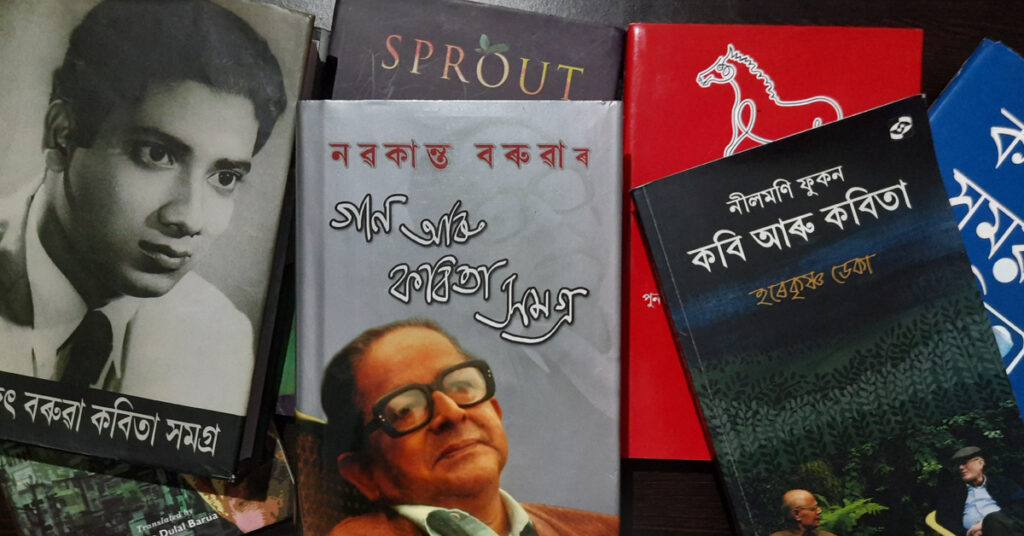A brief overview on some tendencies
By Harekrishna Deka

After the imaginative nature-gazing ‘romantic’ literature of the first half of the twentieth century, Assamese literature ushered in a Modernist phase. In the linear perspective of cultural history, Assamese modern poetry took a linguistic turn in order to represent the change of sensibilities during the second half of the twentieth century: The focus of the poets turned from the content of their poetry to its form.
The Modern phase began and flourished in the 1940s and 1950s with two contesting attitudes regarding the quest for new poetry. Both sides had decided that romantic possibilities obsessed with Nature were exhausted, and that poetry should explore new territories following newer experiences of the modern milieu. While a group of poets representing Marxist class consciousness brought in radical changes to the poetic discourse by focusing on social realism, another group, more concerned with individual sensibilities, experimented with new forms which explored the aesthetic possibilities of language and presented the writers’ emotions suggestively, through striking metaphors and private symbolism. The latter trend gained more popularity, and a quest for the ideal behind apparent reality became the new norm. While formalistic experiments abound, the detachment practiced by the poets made them turn their gaze inward. The complexity of the experienced reality did not find direct expressions in modernist poetry of fifties and sixties of the last century, which one can arguably say as the symbolist-imagist phase of modern Assamese poetry. Gradual Urbanization resulting in modern growth centres ushered in a changing and comparatively faster market economy to the state. This changing life situation with the consolidation of market economy influenced modern sensibility but since urbanization was not rapid, a nostalgia for the preceding rural life of a coherent domesticity presented as a kind of ‘paradise lost’.
Urbanization did not cause anxiety or uncertainty so much but the problems coming in the wake of urbanization and expectations thereof impacted the sensibilities of the new generations. Urbanization encouraged immigrations of some sections of people from outside and the psyche of the growing generations were affected. In the 1980s, large-scale immigration from Bangladesh stirred the consciousness of the young generation and it got transformed into a huge movement. The resultant socio-political turmoil impacted the sensibilities of the writers and socio-economic discourses began to arise in Assamese literature. From the 1980s, the private voices of Assamese poets started giving over to a public voice through subtle shifts. When social upheavals started shaking the public space, the poets started feeling a simultaneous responsibility to provide voices to the radical changes happening in the social space. Poetry’s experimental emphasis was not only towards purification of language anymore, but also towards public expression of the people’s experiences in the life world. From an aspiration to attain musical purification, the poetic gaze turned towards a mode of direct communication in declamatory language or in narrativisation of experienced reality. In this scenario, several discourses emerged around social reality, such as the question of Nationalism of a Nation-State vs the Cultural Nationalism of the community; Progress as an objective of the State vs the Preservation of Identity of the community; the image of the wholeness of a distant past vis a vis the fragmented reality of the present. A golden past is frequently evoked nostalgically.
A corollary to such a development has been a commitment to make our literature strong by exploring the possibility of language as an inexhaustible source of expression for the public mind, through the writer’s ouvre. In order to expand the resources of expression and prove their inclusiveness with mass people, many writers have started using local dialects in very creative ways. The goal of such a movement is no longer the refinement of language as a vehicle of purer expression, but to find the idioms of the folk language to expand the possibilities of the literary language.
Also read: Poetic License
One question lurking behind the literary discourses in Assamese is regarding the writer’s commitment to the social needs of the people, and whether their practices have remained too aesthetic. The society in the throes of an indecisive future wants writers to take the role of clairvoyants and it expects writers to stand with the people rather than be indifferent explorers of linguistic beauty. Modern poetry had an experimental phase, and such experiments took much time to be accepted. The critics played a vital role in this dialogue that would lead to readers responding positively to the changed forms and unconventional experimentation of language. When unfamiliarity with a defamiliarised language jarred the tastes of readers, the critics stepped in with value-judgments as well as analysis to create a space for the good literature. It is the critics that influenced readers’ taste to sift between gems and stones. Communicative exchanges between readers and writers are now better. The tag of ‘obscurity’ has, by and large, been shed by modern literature. However, there is a new spoiler. In recent times, following the emergence of social media as a virtual space for literary activity, an uncritical field for poetic practice has emerged. One worrisome development is the mushrooming of writings on social media without critical inputs, which is circulating widely amongst the mutually appreciative captive audience and writers. Unfortunately, it has been creating an alternative space for all that is pulp, capable of avoiding criticism. Critics and literary scholars contemptuously avoid discussing such fake writings, and in absence of evaluation, such pulp is thriving. Of course, following the unprecedented lockdown of socio-economic activity following Covid-induced pandemic, and the resultant setback to the publication industry, the genuine practitioners of literature are increasingly taking to the virtual space in innovative ways. This may enhance the utility of social media for serious literature, if it’s use can be normalised.
Harekrishna Deka is an Indian poet, short story writer and literary critic of Assam. He is an Adviser of Poetry without Fear.